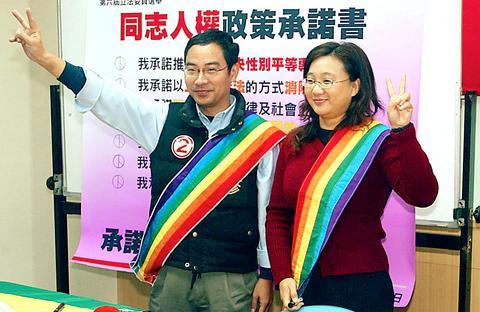A minority group called the Tongzhi Hotline Association yesterday published a "Rainbow List" of gay-friendly candidates in Saturday's legislative elections, hoping to draw out pink voters hidden in the nooks and crannies of Taiwan's polarized political world.
The association sent out 100 survey forms to all legislative candidates in Taipei City, Taipei County, Taoyuan County and Taichung City, quizzing them on the group's policy agenda -- which includes offering free cocktail drug treatment for those infected with HIV, inclusion of different sexual orientations in the Gender Equality in Employment Law (兩性工作平等法), and a proposed "basic human rights protection" law that would ensure gay people's right to work, adoption and having a family.

PHOTO: CNA
Of the 30 responses the group received, it picked the 14 candidates most likely to address the concerns of the gay, lesbian, bisexual and transgendered communities. The 14 recommended candidates from across the political spectrum signed a white paper proposed by the association and pledged to revise relevant laws should they be elected.
Among those on the list are some new faces such as independent candidate Lin Cheng-hsiu (
"In these years when politics seems to be viewed strictly in terms of the green-blue divide, gay-friendly candidates tend to escape notice," said Ashley Wu (巫緒樑), the association's director of public affairs.
"If we do not stand up for ourselves and come out to vote, who is going to stand up for us?" said J. J. Lai (賴正哲), a gay activist and owner of the gay bookstore Gin Gin's.
However, after stumping for candidates who claim to be gay-friendly, the gay rights groups now face another question: Is there such a thing as an identifiable community of gay voters, ripe for mobilization by keen-eyed politicians?
Lai said that in a society where few gays dare to come out of the closet, the number of pink voters is hard to measure.
Despite the uncertain number of gay voters though, the association said that they still have a chance to tip the balance of power if their preferred candidates are elected.
"Look at the 4,000-strong gay pride parade last month," Wu said, "Several politicians and legislative candidates showed up to court gay votes. This speaks to the growing potential of pink voters."
"Also, in the cutthroat battle between pan-blue and pan-green camps, votes from minority groups could be a key factor helping a candidate to victory," he added.
In contrast with the rosy picture drawn by the association to appeal voters, Wang Fang-ping -- one of the candidates recommended by the group -- cast doubt on the credibility of campaign promises.
The real question, Wang said, is that whether candidates trumpet their gay-friendliness out of genuine concern for gay issues, or just as a campaign ploy.
"Post-election supervision is always more important than pre-election endorsements, especially when so many campaign promises are notoriously untrustworthy" said Wang, who long championed the legalization of prostitution and rights of sex workers.
"The gay community should keep a close eye on their candidates. The communities must see if they act on their campaign pledges," she said.
Wang's skepticism echoed the association's last endorsement in the 2001 legislative election, where many recommended candidates, including Sisy Chen (陳文茜), did little to push ahead with legislation to promote gay rights. Others, such as gay candidates Chen Wen-yan (陳文彥) in Taipei and Chan Jing-yan (詹景嚴) in Kaohsiung, simply failed to win legislative seats.

The brilliant blue waters, thick foliage and bucolic atmosphere on this seemingly idyllic archipelago deep in the Pacific Ocean belie the key role it now plays in a titanic geopolitical struggle. Palau is again on the front line as China, and the US and its allies prepare their forces in an intensifying contest for control over the Asia-Pacific region. The democratic nation of just 17,000 people hosts US-controlled airstrips and soon-to-be-completed radar installations that the US military describes as “critical” to monitoring vast swathes of water and airspace. It is also a key piece of the second island chain, a string of

A magnitude 5.9 earthquake that struck about 33km off the coast of Hualien City was the "main shock" in a series of quakes in the area, with aftershocks expected over the next three days, the Central Weather Administration (CWA) said yesterday. Prior to the magnitude 5.9 quake shaking most of Taiwan at 6:53pm yesterday, six other earthquakes stronger than a magnitude of 4, starting with a magnitude 5.5 quake at 6:09pm, occurred in the area. CWA Seismological Center Director Wu Chien-fu (吳健富) confirmed that the quakes were all part of the same series and that the magnitude 5.5 temblor was

The Central Weather Administration has issued a heat alert for southeastern Taiwan, warning of temperatures as high as 36°C today, while alerting some coastal areas of strong winds later in the day. Kaohsiung’s Neimen District (內門) and Pingtung County’s Neipu Township (內埔) are under an orange heat alert, which warns of temperatures as high as 36°C for three consecutive days, the CWA said, citing southwest winds. The heat would also extend to Tainan’s Nansi (楠西) and Yujing (玉井) districts, as well as Pingtung’s Gaoshu (高樹), Yanpu (鹽埔) and Majia (瑪家) townships, it said, forecasting highs of up to 36°C in those areas

IN FULL SWING: Recall drives against lawmakers in Hualien, Taoyuan and Hsinchu have reached the second-stage threshold, the campaigners said Campaigners in a recall petition against Chinese Nationalist Party (KMT) Legislator Yen Kuan-heng (顏寬恒) in Taichung yesterday said their signature target is within sight, and that they need a big push to collect about 500 more signatures from locals to reach the second-stage threshold. Recall campaigns against KMT lawmakers Johnny Chiang (江啟臣), Yang Chiung-ying (楊瓊瓔) and Lo Ting-wei (羅廷瑋) are also close to the 10 percent threshold, and campaigners are mounting a final push this week. They need about 800 signatures against Chiang and about 2,000 against Yang. Campaigners seeking to recall Lo said they had reached the threshold figure over the